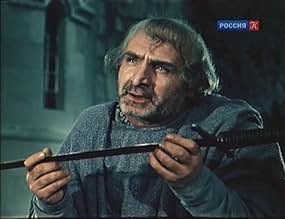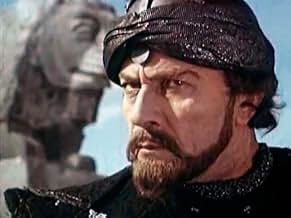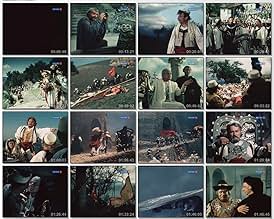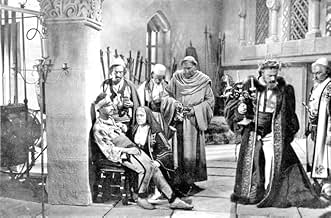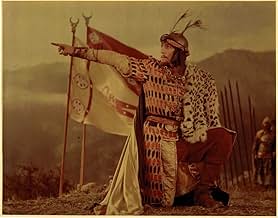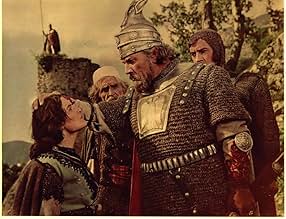VALUTAZIONE IMDb
7,7/10
830
LA TUA VALUTAZIONE
La vera storia dell'Eroe Nazionale degli Albanesi, George Kastrioti Scanderbeg, dalla sua nascita nel 1405, alla sua morte nel 1468.La vera storia dell'Eroe Nazionale degli Albanesi, George Kastrioti Scanderbeg, dalla sua nascita nel 1405, alla sua morte nel 1468.La vera storia dell'Eroe Nazionale degli Albanesi, George Kastrioti Scanderbeg, dalla sua nascita nel 1405, alla sua morte nel 1468.
- Regia
- Sceneggiatura
- Star
- Premi
- 2 vittorie e 1 candidatura in totale
Veriko Anjaparidze
- Dafina
- (as Veriko Andjaparidze)
Recensioni in evidenza
I have recently returned from a visit to Albania; just about everywhere I went I heard about the national hero Skanderbeg, who was King of Albania during a brief period of independence in the fifteenth century. The reason he is regarded as a national hero is because he fought valiantly to preserve the country's independence against the invading Ottoman Turks; he was successful in the short term, but the country was eventually conquered not long after his death in 1468. Although he was a Christian who was fighting against Muslims to keep Albania a Christian country, he is today, ironically, revered by Albania's Muslim majority as well as its Christian minority.
Indeed, he was even revered by the militantly atheistical regime of the country's Communist dictator, Enver Hoxha. This film was made in 1953, during the Communist era, as a Soviet-Albanian coproduction, although the Soviet contribution was the greater, unsurprisingly given the small size of Albania and its economy. Most of the film was a shot in the Soviet Union by a Russian director, Sergei Yutkevich and it was made in Russian using Soviet (but not necessarily ethnically Russian) actors; Skanderbeg himself is played by a Georgian, Akaki Khorava. The film was then dubbed for showing in Albania; it was this Albanian-language version which I recently came across on YouTube.
As a child, the young George Kastrioti (Skanderbeg's real name) is sent as a hostage to the court of the Ottoman Sultan, where he raised as a Muslim and becomes a warrior in the Sultan's army. His love for his homeland, however, impels him to return to Albania where he puts himself at the head of the nationalist cause and leads his people in their struggle for freedom.
The film was recommended to me by our guide in Albania, who described it as the Communist bloc's answer to Western films such as "Spartacus" and "The 300 Spartans". In fact, both those films were made a few years after "The Great Warrior Skanderbeg", although in its grand visual style it has something in common with earlier Hollywood epics such as "Samson and Delilah" or "Quo Vadis?"
Although it was made during the Communist period, it is not notably Communist in its themes; there is, for example, no attempt to portray Skanderbeg as a proto-socialist. It is about patriotism and national struggles rather than about class struggles, with the Albanians (apart from a few pro-Turkish traitors) heroic and the Turks bloodthirsty villains. The way in which various other nationalities are portrayed, however, may owe something to Cold War rivalries. The villains, apart from the Turks, are the Serbs and the Venetians, shown as treacherous and unreliable allies of the Albanians, whereas their true friends are the Poles and Hungarians. In 1953, of course, Italy, like Turkey, was a member of NATO and Tito's Yugoslavia, although officially Communist, was despised by Hoxha's regime as "revisionist". Poland and Hungary, however, were Albania's allies in the Warsaw Pact. After Albania broke away from the Soviet Bloc in 1960, the film continued to be shown, but now it had a different meaning. Skanderbeg became a symbol of gallant little Albania standing alone against a hostile world.
Trying to evaluate the film is a difficult task for a non-Albanian. On the one hand, it is often grand and stirring. On the other, it can at times seem static and the acting does not always seem inspired, although this may be due to the fact that I was watching it in a dubbed version. I always, however, found it worth watching of the insights it affords into another nation's culture and history. 7/10.
Indeed, he was even revered by the militantly atheistical regime of the country's Communist dictator, Enver Hoxha. This film was made in 1953, during the Communist era, as a Soviet-Albanian coproduction, although the Soviet contribution was the greater, unsurprisingly given the small size of Albania and its economy. Most of the film was a shot in the Soviet Union by a Russian director, Sergei Yutkevich and it was made in Russian using Soviet (but not necessarily ethnically Russian) actors; Skanderbeg himself is played by a Georgian, Akaki Khorava. The film was then dubbed for showing in Albania; it was this Albanian-language version which I recently came across on YouTube.
As a child, the young George Kastrioti (Skanderbeg's real name) is sent as a hostage to the court of the Ottoman Sultan, where he raised as a Muslim and becomes a warrior in the Sultan's army. His love for his homeland, however, impels him to return to Albania where he puts himself at the head of the nationalist cause and leads his people in their struggle for freedom.
The film was recommended to me by our guide in Albania, who described it as the Communist bloc's answer to Western films such as "Spartacus" and "The 300 Spartans". In fact, both those films were made a few years after "The Great Warrior Skanderbeg", although in its grand visual style it has something in common with earlier Hollywood epics such as "Samson and Delilah" or "Quo Vadis?"
Although it was made during the Communist period, it is not notably Communist in its themes; there is, for example, no attempt to portray Skanderbeg as a proto-socialist. It is about patriotism and national struggles rather than about class struggles, with the Albanians (apart from a few pro-Turkish traitors) heroic and the Turks bloodthirsty villains. The way in which various other nationalities are portrayed, however, may owe something to Cold War rivalries. The villains, apart from the Turks, are the Serbs and the Venetians, shown as treacherous and unreliable allies of the Albanians, whereas their true friends are the Poles and Hungarians. In 1953, of course, Italy, like Turkey, was a member of NATO and Tito's Yugoslavia, although officially Communist, was despised by Hoxha's regime as "revisionist". Poland and Hungary, however, were Albania's allies in the Warsaw Pact. After Albania broke away from the Soviet Bloc in 1960, the film continued to be shown, but now it had a different meaning. Skanderbeg became a symbol of gallant little Albania standing alone against a hostile world.
Trying to evaluate the film is a difficult task for a non-Albanian. On the one hand, it is often grand and stirring. On the other, it can at times seem static and the acting does not always seem inspired, although this may be due to the fact that I was watching it in a dubbed version. I always, however, found it worth watching of the insights it affords into another nation's culture and history. 7/10.
This movie i saw as kid in Albania many years ago and still it make me spell bound with its fabulous dance moments which are amazing knowing this is a 1953 production so much better that today Bollywood crap. Skanderbeg was a hero of Albania and Mel Gibson should do a new version of this movie which will make William Walace(BraveHeart)LOOK LIKE A CHICKEN FARMER IN Scotland. In today day and age having an Albanian 1953 color picture is a true blessing.Yes the acting may seem and look bit outdated and wooden but the fact remain that Russian touch has helped Skanderbek shine and for my liking this is a CLASSIC... Here is some historical facts about George Kastrioti nicknamed in honor of Alexander The Great Skander and title Beg. Gjergj (Albanian: George) Kastrioti was born in Kruja from Gjon Kastrioti, lord of Middle Albania, who was obliged by the Ottomans to pay tribute to the Empire. To assure the fidelity of local rulers the Sultan used to take their sons as hostage and bring them up in his court. Gjergj Kastrioti attended military school in the Ottoman Empire and was named Iskander Bey which in Turkish means Lord Alexandre.
He was distinguished as one of the best officers in several Ottoman campaigns both in Asia Minor and in Europe, and the Sultan appointed him General. He even fought against Greeks, Serbs and Hungarians, and some sources says that he used to maintain secret links with Raguse, Venice, Vladislas of Hungary et Alphonse V of Naples. Sultan Murat II gave him the title Vali which made him the General Governor of some provinces in central Albania. He was respected everywhere but he missed his country.
In 1443, during the battle against the Hungarians of Hunyadi in Nish (in present day Serbia), he abandoned the Ottoman Army and captured Kruja, his father's seat in middle Albania. Above the castle he rose the Albanian flag, a red flag with the black double-headed eagle, the present-day Albanian flag, and pronounced to his countrymen the famous words: "I have not brought you liberty, I found it here, among you". He managed to unite all Albanian princes at the town of Lezha (League of Lezha, 1444) and united them under his command to fight against the Turks.
During the next 25 years he fought, with forces rarely exceeding 20,000 against the most powerful army of that time and defeated it for 25 years. In 1450 the Turkish army was led by the Sultan Murad II in person, who died after his defeat in the way back. Two other times, in 1466 and 1467, Mehmed II, the conqueror of Constantinople, led the Turkish army himself against Skenderbeg and failed too. The Ottoman Empire attempted to conquer Kruja 24 times and failed all 24 of them.
Skenderbeg's military successes evoked a good deal of interest and admiration of the Papal state, Venice and Naples, themselves threatened by the growing Ottoman power across the Adriatic. The Albanian warrior played his hand with a good deal of political and diplomatic skill in his dealings with the three Italian states. Hoping to strengthen and expand the last Christian bridgehead in the Balkans, they provided Skenderbeg with money, supplies and occasionally with troops. One of his most powerful and consistent supporters was Alfonso the Magnanimous (1416-1458), the Aragone king of Naples, who decided to take Skenderbeg under his protection as vassal in 1451, shortly after the latter had scored his second victory against Murad II. In addition to financial assistance, the King of Naples undertook to supply the Albanian leader with troops, military equipment as well as with sanctuary for himself and his family if such a need should arise.As an active defender of the Christian cause in the Balkans, Skenderbeg was also closely involved with the politics of four Popes, one of them being Pius II (1458-1464) or Aeneas Sylvius Piccolomini, the Renaissance humanist, writer and diplomat.
Profoundly shaken by the fall of Constantinople in 1453, Pius II tried to organise a new crusade against the Turks; consequently he did his best to come to Skenderbeg's aid, as two of his predecessors Nicholas V and Calixtus III, had done before him. This policy was continued by his successor, Paul II,(1464-1473).They gave him the title Athleta Christi.
For a quarter of a century he and his country prevented Turks from invading Catholic Western Europe.
After his death from natural causes in 1468 in Lezha, his soldiers resisted the Turks for the next 12 years. In 1480 Albania was finally conquered by the Ottoman Empire. When the Turks found the grave of Skenderbeg in Saint Nicholas church of Lezha, they opened it and held his bones like talismans for luck. In 1480 the Turks invaded Italy and conquered the City of Otranto.
Skenderbeg's posthumous renown was by no means confined to his own country. Voltaire thought the Byzantine Empire would have survived had it possessed a leader of his quality. A number of poets and composers have also drawn inspiration from his military career. The French sixteenth-century poet Ronsard wrote a poem about him and so did the nineteenth-century American poet Longfellow. Antonio Vivaldi, too, composed an opera entitled Scanderbeg.
Skenderbeg today is the National Hero of Albania. Many museums and monuments are raised in his honour around Albania, and among them the Museum of Skenderbeg in his famous castle in Kruja.
Bibliography: Noli, Fan S.: George Castrioti Scanderbeg, New York, 1947 Logoreci, Anton: The Albanians, London, 1977
He was distinguished as one of the best officers in several Ottoman campaigns both in Asia Minor and in Europe, and the Sultan appointed him General. He even fought against Greeks, Serbs and Hungarians, and some sources says that he used to maintain secret links with Raguse, Venice, Vladislas of Hungary et Alphonse V of Naples. Sultan Murat II gave him the title Vali which made him the General Governor of some provinces in central Albania. He was respected everywhere but he missed his country.
In 1443, during the battle against the Hungarians of Hunyadi in Nish (in present day Serbia), he abandoned the Ottoman Army and captured Kruja, his father's seat in middle Albania. Above the castle he rose the Albanian flag, a red flag with the black double-headed eagle, the present-day Albanian flag, and pronounced to his countrymen the famous words: "I have not brought you liberty, I found it here, among you". He managed to unite all Albanian princes at the town of Lezha (League of Lezha, 1444) and united them under his command to fight against the Turks.
During the next 25 years he fought, with forces rarely exceeding 20,000 against the most powerful army of that time and defeated it for 25 years. In 1450 the Turkish army was led by the Sultan Murad II in person, who died after his defeat in the way back. Two other times, in 1466 and 1467, Mehmed II, the conqueror of Constantinople, led the Turkish army himself against Skenderbeg and failed too. The Ottoman Empire attempted to conquer Kruja 24 times and failed all 24 of them.
Skenderbeg's military successes evoked a good deal of interest and admiration of the Papal state, Venice and Naples, themselves threatened by the growing Ottoman power across the Adriatic. The Albanian warrior played his hand with a good deal of political and diplomatic skill in his dealings with the three Italian states. Hoping to strengthen and expand the last Christian bridgehead in the Balkans, they provided Skenderbeg with money, supplies and occasionally with troops. One of his most powerful and consistent supporters was Alfonso the Magnanimous (1416-1458), the Aragone king of Naples, who decided to take Skenderbeg under his protection as vassal in 1451, shortly after the latter had scored his second victory against Murad II. In addition to financial assistance, the King of Naples undertook to supply the Albanian leader with troops, military equipment as well as with sanctuary for himself and his family if such a need should arise.As an active defender of the Christian cause in the Balkans, Skenderbeg was also closely involved with the politics of four Popes, one of them being Pius II (1458-1464) or Aeneas Sylvius Piccolomini, the Renaissance humanist, writer and diplomat.
Profoundly shaken by the fall of Constantinople in 1453, Pius II tried to organise a new crusade against the Turks; consequently he did his best to come to Skenderbeg's aid, as two of his predecessors Nicholas V and Calixtus III, had done before him. This policy was continued by his successor, Paul II,(1464-1473).They gave him the title Athleta Christi.
For a quarter of a century he and his country prevented Turks from invading Catholic Western Europe.
After his death from natural causes in 1468 in Lezha, his soldiers resisted the Turks for the next 12 years. In 1480 Albania was finally conquered by the Ottoman Empire. When the Turks found the grave of Skenderbeg in Saint Nicholas church of Lezha, they opened it and held his bones like talismans for luck. In 1480 the Turks invaded Italy and conquered the City of Otranto.
Skenderbeg's posthumous renown was by no means confined to his own country. Voltaire thought the Byzantine Empire would have survived had it possessed a leader of his quality. A number of poets and composers have also drawn inspiration from his military career. The French sixteenth-century poet Ronsard wrote a poem about him and so did the nineteenth-century American poet Longfellow. Antonio Vivaldi, too, composed an opera entitled Scanderbeg.
Skenderbeg today is the National Hero of Albania. Many museums and monuments are raised in his honour around Albania, and among them the Museum of Skenderbeg in his famous castle in Kruja.
Bibliography: Noli, Fan S.: George Castrioti Scanderbeg, New York, 1947 Logoreci, Anton: The Albanians, London, 1977
The movie tells about the legendary almost mythical exploits of George Castriot Scanderbeg against one of the most ruthless and greatest empires of the world, the Ottoman Empire. I gave this movie a 7 however because it does not portray Scanderbeg's true image. He was not a mountain dweller rather he was a Prince of very noble blood, and it said in the chronichles of the Musachi Princes and in the biography of Jacques Lavardine that Scanderbeg's family could trace back it's roots up to 30 generations, and that they were directly tied to the legendary Phyrrus King of Epirus descendant of the Achilles the Epirotan, and from there stems the powerful race of the Epirotans a semi pelasgian-illyrian tribe. This background is not in the movie, partly because those information came only in the last 20 years, which makes me wonder when will Hollywood write a script about the true story of what can be called the last warrior king and erudite in the same fashion as the Arthurian legends(only this one we know for sure to be real) and many other valorous comandants of the history of mankind.
We had Troy, Alexander and even Hercules, now it's time to write about the great Scanderbeg and how he saved Europe from the Ottoman threat by fighting with them alone(with minor support from the Pope) for more then 25 years.
This is a must see movie, I don't know if they have managed to put subscripts, but the music is certainly amazing, and considering hat this was done with the help of the russians because albania was too poor to afford such a movie I think that overall for the time, for the knowledge we had about Scanderbeg, or I should say the widespread common knowledge that we had about him, this is truly a remarkable movie with it's artistic elements.
The guy who plays Scanderbeg is also the best match they could find. I'm sure the counterpart of him would be Russell Crow today.
We had Troy, Alexander and even Hercules, now it's time to write about the great Scanderbeg and how he saved Europe from the Ottoman threat by fighting with them alone(with minor support from the Pope) for more then 25 years.
This is a must see movie, I don't know if they have managed to put subscripts, but the music is certainly amazing, and considering hat this was done with the help of the russians because albania was too poor to afford such a movie I think that overall for the time, for the knowledge we had about Scanderbeg, or I should say the widespread common knowledge that we had about him, this is truly a remarkable movie with it's artistic elements.
The guy who plays Scanderbeg is also the best match they could find. I'm sure the counterpart of him would be Russell Crow today.
This movie is a great one. Unlike "Troy" or "Alexander" this one has its own goods. There are the scene fights, small love lines, and magic if you ask me. This historic movie about the Albanian hero "Skenderbeu" is what a family movie should be about. Is educational and not very violent, and as far as my opinion I think of it as a PG-13 movie. Would be great if Hollywood creates a version of this movie, I, my self believe it wold be great to experience something with the great technology at hand now and compare it with the 1970's version of this movie. There is anything about this movie that all the other movies should have, meaning. There is clearly a very good history line behind this movie. Starting in the beginning with a abduction of the Albanian brethren to the day when "Skenderbeu" betrays the Turks and gets back to its place, Albania.
Gjergj Kastrioti Skënderbeu is national hero of us and we're very thankful to all that made this film possible. The successor of Alexander of Macedon and Phyrrus of Epirus, Skënderbeu returned to his forefathers land to led the battels for freedom against the Ottomans. I'm grandson of two great-grandfathers who fought against the Greek chauvinists in southern Albania (Epir that means E Pirros) and they've fallen to protect Albania.
To end this write, I have to say that Albania will never be in the hands of the invaders and we will get our lands back again!
Lo sapevi?
- QuizThe film was remastered in 2012 for Albania's 100th anniversary for independence.
I più visti
Accedi per valutare e creare un elenco di titoli salvati per ottenere consigli personalizzati
- How long is Skanderbeg?Powered by Alexa
Dettagli
- Tempo di esecuzione
- 1h 35min(95 min)
- Mix di suoni
- Proporzioni
- 1.37 : 1
Contribuisci a questa pagina
Suggerisci una modifica o aggiungi i contenuti mancanti

